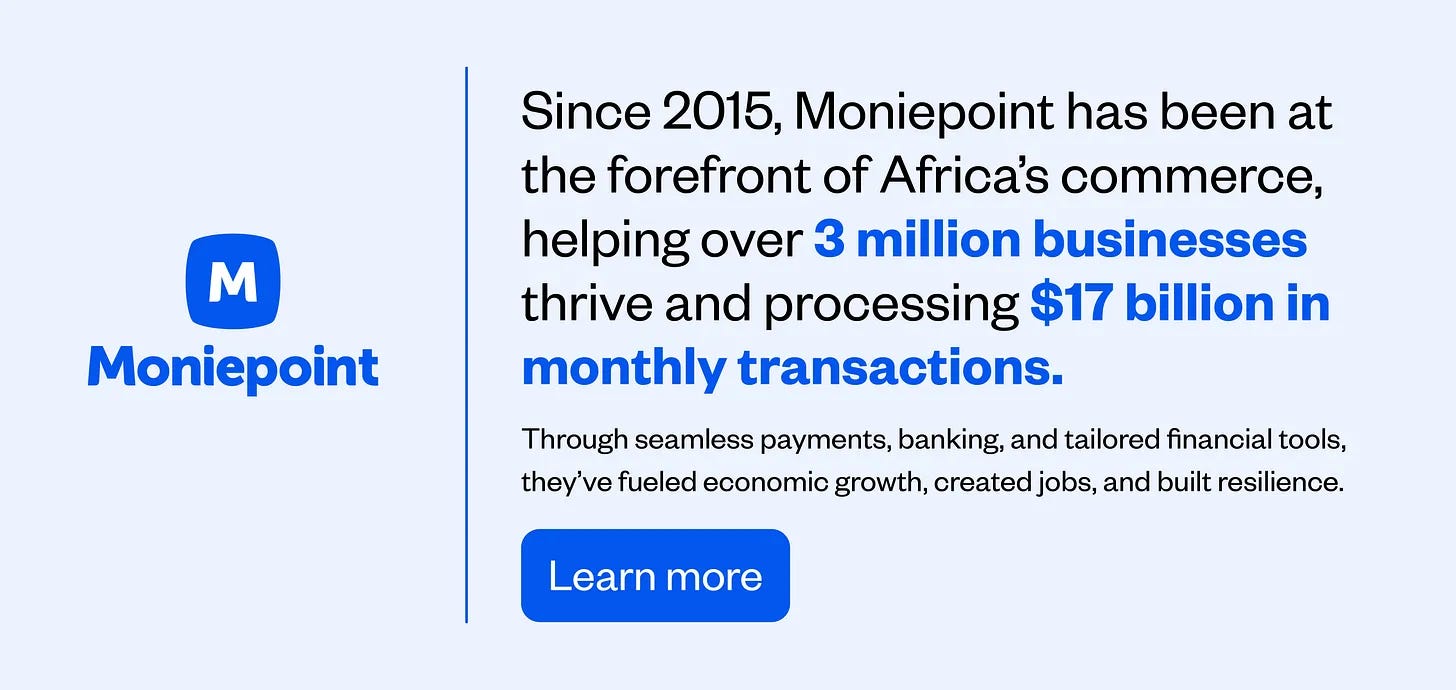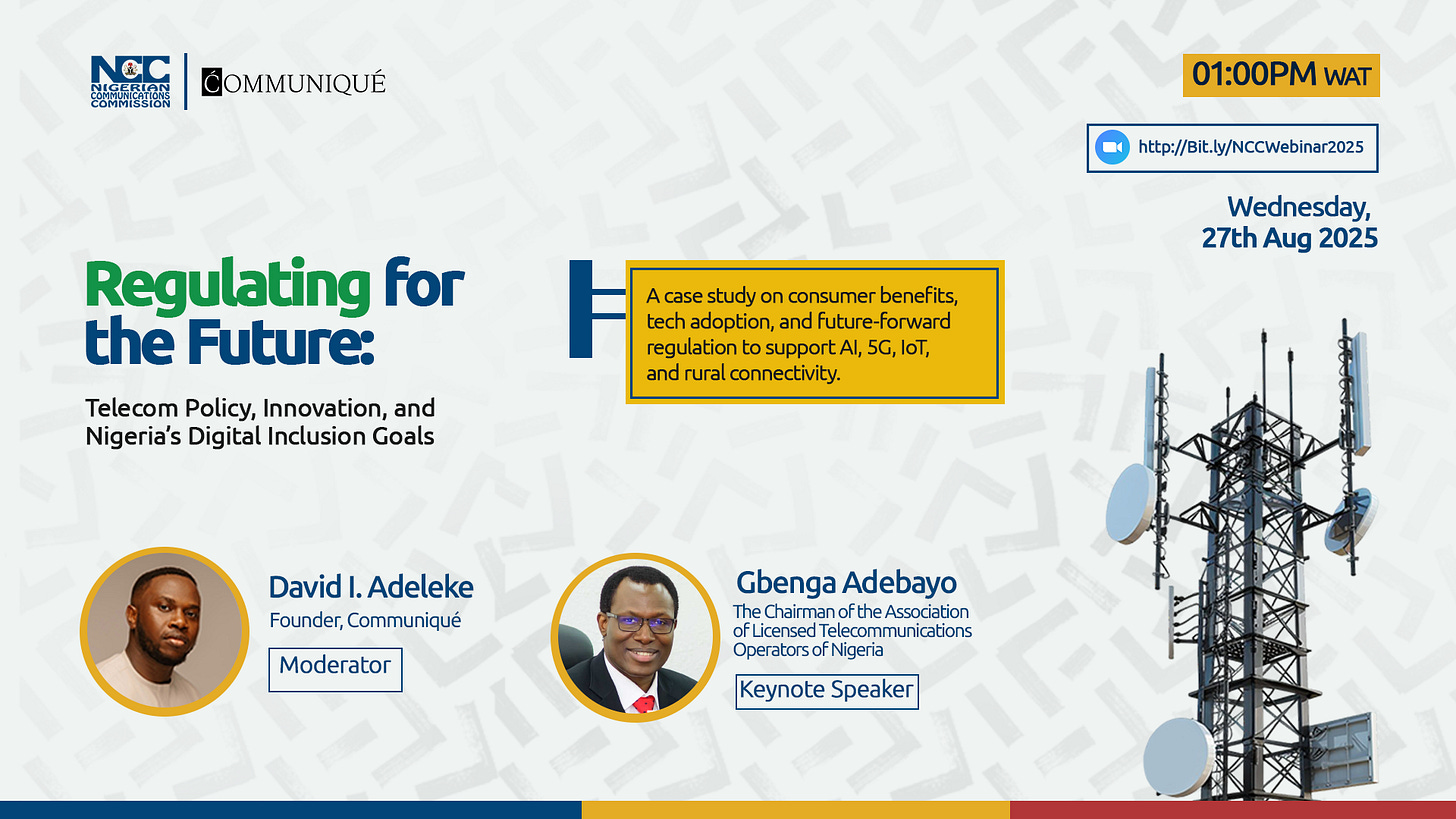Communiqué 85: Crea8torium wants to be the classroom for African creators
With Crea8torium, Salem King and Adaora Mbelu could recreate the success of the Colin and Samir show for African creators.
Presented by Moniepoint
Why this matters
There is still an opportunity to create localised, context-specific resources and platforms for the African creator economy.
Multiple monetisation paths exist for media businesses, including live events, memberships, courses, reports, and other community-driven products for creators.
Community events can help scale brands, becoming revenue streams while strengthening loyalty and positioning brands as key players in the industry.
1. The interview show, recre8ted
The lights are on, cameras rolling, and content creator Salem King and his co-host Adaora Mbelu sit across from chess master Tunde Onakoya as he tells his story for the umpteenth time. It is a story that we have come to know very well: the boy from one of Lagos’s poorest neighbourhoods who discovered chess, became a prodigy, made his way out of the slums, and went on to break the Guinness World Record for the longest time spent playing the game. Beyond the accolades, Onakoya is now using chess to give slum kids like him a shot at education and a future.
Most media outlets frame Onakoya’s journey as a classic tale of triumph against the odds. However, Crea8torium, Salem King's, and Adora Mbelu’s new show takes a different approach. Their conversation with Onakoya isn’t about the thrill of breaking records but the craft of storytelling, how he built an audience that rallied behind his mission, and what lessons other creators with similar ambitions can draw from that journey.
Since 2020, interview shows and podcasts have proliferated, often chasing entertainment value and mass appeal. But Crea8torium flips the script: its audience isn’t the general public, but creators themselves. Where others seek to entertain, King and Mbelu seek to educate, turning conversations with themselves and other creators into a playbook for a generation of up-and-coming African creators trying to make art, build communities, and sustain livelihoods in a fragile ecosystem. If this sounds familiar, it’s because you’ve seen it elsewhere before.
2. The Colin and Samir blueprint
Colin Rosenblum and Samir Chaudry first met in 2012 while individually building YouTube channels around lacrosse content. They eventually joined forces, building (and later selling) a lacrosse-focused digital sports network, experimenting with podcasts and YouTube shows, and even dabbling in consulting and filmmaking. But a couple of years ago, they stumbled on something that stuck: their conversations with other creators. How did they get into the industry? How do they make a living from it? What keeps them going when the money or motivation runs thin?
Those conversations became the backbone of Colin and Samir, their now self-titled YouTube talk show. Each episode pulls back the curtain on the mechanics of creator life: the grind of audience-building, the business models that work, and the emotional rollercoaster of staking your livelihood on content. “We wanted to create a show that provided a sense of community for creators, a place to learn about what it’s like to grow a career and to feel less alone. We feel like being a creator is one of the most sought-after careers, and also one of the least understood. Our goal is to shine some light on how different people are actually pursuing this career,” they said in a Rolling Stone interview.
They have been remarkably successful in pursuing that goal. What started as a niche experiment has grown into one of the most influential creator-focused platforms in the world. Over the last five years, Colin and Samir have sat across from some of the biggest names in the creator economy, including MrBeast, MKBHD, Emma Chamberlain, and countless others, dissecting not just their content but the choices, failures, and strategies behind their careers. Their videos have garnered over 400 million views, and their channel has over 1.5 million subscribers.
The duo has learned the pressures, pitfalls, and promises of building a career as a creator. And that’s where the parallels with Crea8torium begin to emerge. Just as Colin and Samir built a space for Western creators to swap lessons and trade playbooks, King and Mbelu are trying to do the same for Africa’s fast-growing but precarious creator economy.
3. The case for educating African content creators
In Africa’s creator economy, talent is rarely the problem. The continent is bursting with dancers, filmmakers, comedians, gamers, podcasters, and storytellers who command millions of views. But beneath the surface lies a quieter struggle: most creators know how to make content, but not how to build businesses and sustainable careers around it.
The knowledge gap is structural. Platforms like YouTube, TikTok, and Instagram have built support systems for American and European creators, but their African counterparts operate with limited or no access to similar structures.
There is no structured process for building a career from content. For example, with monetisation, Western creators receive direct payouts from platforms for their content, but this is not yet widely available in Africa. That leaves brand deals as the primary revenue stream for creators. But these deals are negotiated without standard rates, transparency, or industry data. For every creator who breaks out globally, countless others remain underpaid, undervalued, or unable to scale beyond hustling for virality.
This is the problem Salem King and Adaora Mbelu are trying to solve with Crea8torium, an African counterpart to the Colin and Samir show. However, the context differs: the advice isn’t about maximising YouTube AdSense or TikTok payouts. It’s about how to survive and grow in an ecosystem where platforms don’t pay, brands lowball, and creators have to become their own managers, agents, and accountants.
Every episode is a case study: how to build a brand with storytelling for social impact or how to collaborate properly with other creators. Crea8torium is independent, candid, unfiltered, and built on shared experience, unlike platform-sponsored workshops, which are helpful but often double as marketing.
4. Building out a Crea8torium ecosystem
If the show is the heartbeat of Crea8torium, the next phase is about building out its body; expanding the idea into formats, products, and experiences that serve creators. Salem and Adora have already tested the waters with live watch parties in Lagos and Abuja, bringing together creators for intimate conversations and networking. But that’s only the beginning.
Expansion looks something like this:
Community Hub: At the centre is a dedicated online community where creators can exchange advice, share opportunities, and access resources. Think of it as the WhatsApp group every creator wishes they had, providing structured, moderated, and enriched with insights from industry experts. Over time, this could evolve into a paid membership model offering access to exclusive content, workshops, and industry data.
Education: The episodes are already masterclasses, but Crea8torium can codify these lessons into structured learning. This means creator playbooks and guides on everything from negotiating brand partnerships to building sustainable production workflows. Packaged as e-books, video courses, or even a full-scale “Crea8torium Academy,” these offerings would serve creators who want more than just inspiration.
Data and Insights: One of the most significant gaps in Africa’s creator economy is the absence of reliable market data; how much to charge for a brand deal, what CPMs look like, and how engagement benchmarks differ across regions. Crea8torium could fill that gap by publishing reports and trend analyses from surveys, interviews, and case studies with creators in its community. Communiqué has done its part to provide some of that data. In 2024, we launched the first African creator economy report. But having more than one player provides insight into the creative economy, so it doesn't hurt. A Crea8torium creator economy report would be equally impactful and speak more directly to creators.
Expanding Events: In Communiqué 42, analysing Big Cabal Media’s event strategy, we stated that:
“Events provide an opportunity to diversify and increase revenue streams beyond traditional advertising and content monetisation. With ticket sales, sponsorship deals, and branded partnerships, events can become a significant source of income. Second, hosting events allows BCM to strengthen its relationship with its audience by offering in-person experiences that build a sense of community and deepen audience loyalty. These events bring readers closer to the brand, giving them direct access to the people behind the publications and creating memorable, engaging experiences that foster long-term connections. Also, events are a powerful tool for brand building, as they position BCM not just as a publisher but as a key player in driving conversations, cultural movements, and thought leadership within the communities and industries it serves.”
What works for Big Cabal Media could also work for Crea8torium. The early live gatherings can grow into a travelling series across African cities — Nairobi, Accra, Johannesburg, Cairo — helping spotlight local creator communities while connecting them to the broader ecosystem. Over time, these could culminate in an annual Crea8torium Summit: part knowledge exchange, part creator festival, part marketplace for creators to showcase their work.
Crea8torium is still in its early days, but its ambition is clear. Where most creator-focused platforms in Africa remain scattered, temporary, or tied to corporate sponsorships, Salem King and Adaora Lumina are building something more permanent, rooted in community. The show may have started as a series of conversations in a studio, but the bigger play is to create an ecosystem where African creators can learn from one another, share data, and begin to professionalise an industry that has long been undervalued.
We just launched the NCC Impact Report
We just launched an impact report on the Nigerian Communications Commission’s policies between 2023 and 2025, and the findings are revealing. From tariff hikes that boosted telco profits (and paid for some much-needed infrastructure upgrades) to how vandalism disrupts telco operations, the report traces where policy has worked and where it’s stalled.
Also, we will be hosting a webinar tomorrow, at 1 PM WAT to discuss the report and how NCC’s policies are shaping Nigeria’s digital future.
Register to attend the webinar here: Bit.ly/NCCWebinar2025
And download the report here: Bit.ly/NCCImpactReport





